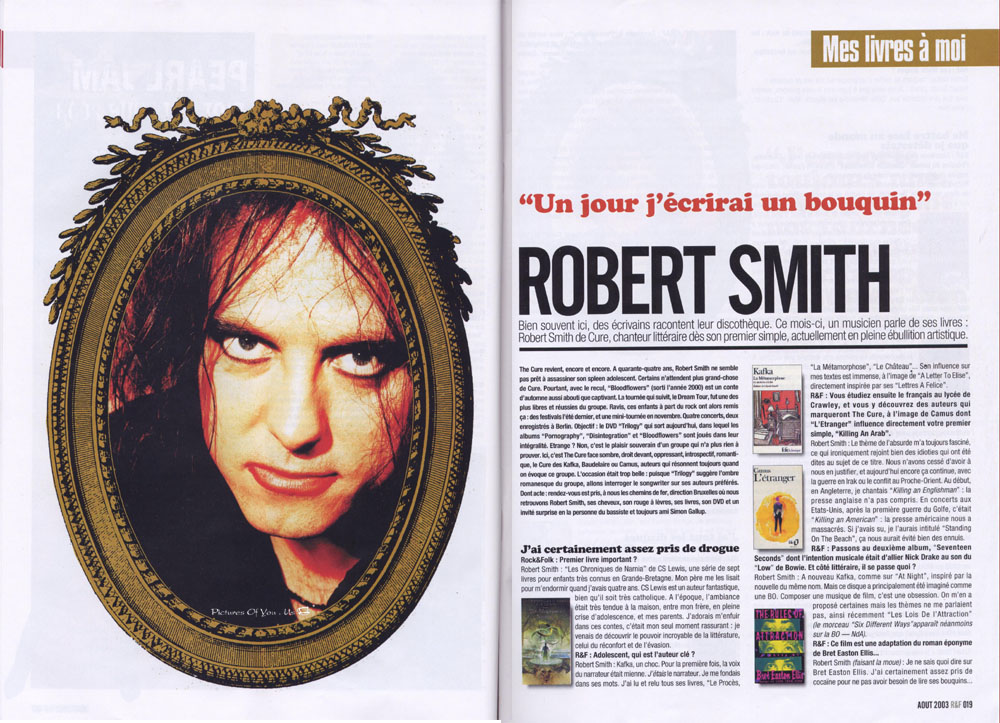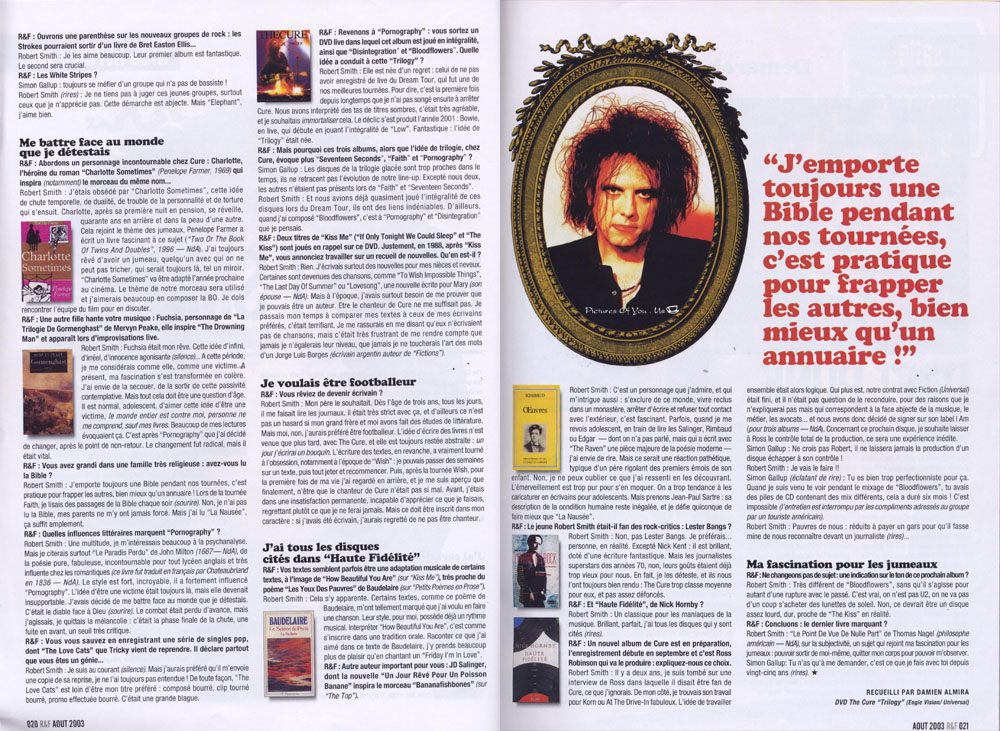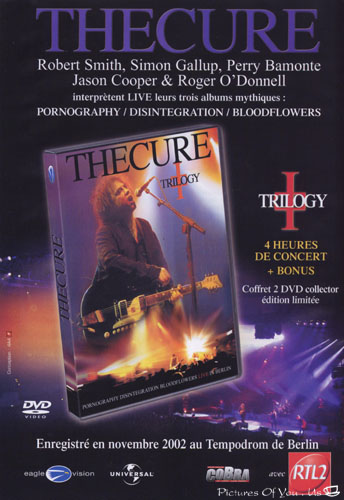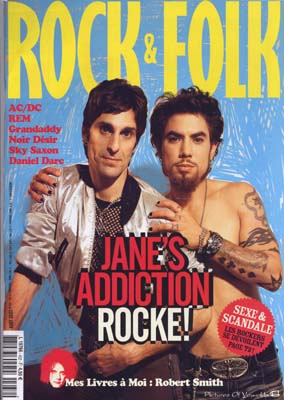August 2003 - Rock & Folk (France) (Translation Below)



 cover
cover
August 2003 - Rock & Folk (France) (Translation
Below)



 cover
cover
"Rock and Folk" article : Robert Smith and his books
Quite often here, writers are talking about
their fav records. This month, a musician is talking about his books :
Robert Smith of The Cure, literary singer at his very first single, now in a
full artistic ebullition.
The Cure come back, again and again. Aged
44, Robert Smith doesn't seem to be ready to kill his teenage spleen.
Some didn't expect something from The Cure. However, looking back, "Bloodflowers"
released in 2000 is an
autumn tale, as accomplished as enthralling. Delighted, these one of a kind
children of rock went into it again :
some festivals last summer, and a mini tour in November. Four concerts, two
recorded in Berlin. The aim : the
"Trilogy" DVD that goes out today, on which "Pornography", "Disintegration"
and "Bloodflowers" are played in
their entirety. Strange ? No, it's the sovereign pleasure of a band that has
nothing more to prove.
Here, it's the dark side of The Cure,
straight ahead, oppressing, introspective, romantic, The Cure of Kafka,
Baudelaire and Camus, authors that always resonate when talking about the
group, that is conjured up. The
opportunity was too great : as "Trilogy" suggests the romantic shadow of the
group, let's go and ask the
songwriter about his favourite authors.
Appointment is taken, railways to Brussels
where we meet Robert Smith, his hair, his lipstick, his books, his DVD
and a special guest, bassist and forever friend Simon Gallup.
Rock and Folk : First important book .
Robert Smith : "Narnia chronicles" by CS
Lewis, a series of 7 books for children, very famous in the UK. My
father used to read them to send me to sleep when I was 4. CS Lewis is a SF
author, even if he's very catholic. At
that time, the mood was quite sharp between my father and my brother, in his
teenage crisis. I adored running
away in those tales, it was my only reassuring moment : I was just
discovering the incredible power of literature,
the one of consolation and evasion.
RF : As a teenager, who was the key author ?
RS : Kafka, a lot. For the first time, the
narrator's voice was mine. I was the narrator. I was blending myself in his
words. I read and read again all of his books, "The trial", "The
metamorphosis", "The castle"... His influence on
my texts is huge, as on "A letter to Elise" directly inspired by his "Letters
to Felice".
RF : Then you studied French at Crawley
college, where you discover authors who will leave their mark on The
Cure, like Camus whom "The stranger" directly influence your first single
"Killing an Arab".
RS : The theme of the absurd has always
fascinated me, that ironically joined all those idiocies that have been
said about this track. We never gave up to have to justify ourselves, and
today it continues, with War in Iraq or the
Middle East conflict. At the beginning in the UK, I used to sing "Killing an
Englishman", the British press didn't
understand. During concerts in the US after the first Gulf War, it was
"Killing an American" : the American press
just massacred us. If I knew it before, I would have called it "Standing on
the beach", it would have avoided many
troubles.
RF : Let's go to the second album,
"Seventeen Seconds", which musical intention was to unify Nick Drake and
Bowie's "Low" sound. On the literary side, what happens then ?
RS : Kafka again, as on "At night", inspired
by the so called novel. But this record was mainly thought like a
soundtrack. Composing for a movie is like an obsession. I've been proposed a
lot but the themes didn't talk to me,
like recently "Rules of Attraction" ("Six different ways" nevertheless
appears on the soundtrack).
RF : This movie is an adaptation of Bret Easton Ellis eponym novel.
RS (scowling) : I don't know what to say
about Bret Easton Ellis. I certainly took enough drugs not to have to read
his books...
RF : Let's open brackets on new rock bands : The Strokes could come out from a Bret Easton Ellis book...
RS : I like them very much. Their first album is fantastic. Their second one will be crucial.
RF : The White Stripes ?
Simon Gallup : We must always be careful with a band with no bassist !
RS (laughing) : I don't want to judge these
young groups, particularly those I don't appreciate. This behaviour is
despicable. But "Elephant", I like.
RF : Let's talk about a must character for
The Cure : Charlotte, the heroin of Penelope Farmer's "Charlotte
Sometimes" novel that inspired the so called track.
RS : I was obsessed by "Charlotte
Sometimes", this idea of temporal fall down, of duality, of personality trouble
and the torture that follows. Charlotte, after my first night in boarder,
wakes up, 40 years back and in another
skin. This connects with the theme of twins, Penelope Farmer wrote a
fascinating book about that ("Two or the
book of twins and doubles", 1996). I've always dreamed of having a twin,
somebody who you can't trick with, who
would always be there, like a mirror. "Charlotte Sometimes" will be filmed
next year. The theme of our single will
be used for it and I'd love to compose the soundtrack. I have to meet the
movie crew to talk about that.
RF : Another girl haunts your music :
Fuschia, character of "Gormenghast trilogy" by Mervyn Peake, she
inspires "The drowning man" et appears on live improvisations.
RS : Fuschia was my dream. This idea of
infinite, of unreal, of dying innocence (silence)... At that time I was
considering myself as her, as a victim. Now my fascination transmuted into
anger. I want to shake her, to put her
out of her contemplative passivity. But all of this is question of age. It's
normal, as a teenager, to love this idea of
being a victim, the whole world is against me, no one understands me, except
my books. Lots of my reading
connected with that. It's been after "Pornography" that I decided to change,
after the no return point. This change
has been radical, but it's been vital.
RF : You grew up in a very religious family : did you read the Bible ?
RS : I always take a Bible while touring,
it's useful to hit the others, better than a phonebook ! During the Faith
tour, I used to read some Bible passages each evening (smiling). No I never
read the Bible, my parents never
forced me to. But I read "The nausea", it's far enough !
RF : Which literatures influence "Pornography" ?
RS : A lot, I was very interested in
psychoanalysis. But I would mention "The Lost Paradise" by John Milton
(1667), pure poetry, fabulous, a must for an English grammar school pupil and
very influencing on romantics
writers. The style is strong, incredible. It strongly influenced
"Pornography". The idea of being a victim was still
there, but it was becoming unbearable. I had decided to struggle in front of
a world I hated. It was Devil against
God (smiling). The fight was lost in advance, but I was acting, I was leaving
melancholy : it was the final part of the
fall, an ahead run away, a critical threshold.
RF : You saved yourself recording a pop
singles series, among them "The Love Cats" that Tricky has just
covered. He declares everywhere that you're a genius...
RS : I know (silence). But I would have
prefer he sent me a copy of his cover, I still haven't heard it. Anyway
"The Love Cats" is far from being my favourite song : composed drunk, video
filmed drunk, promotion made
drunk. It was a joke.
RF : Let's come back to "Pornography".
You're releasing a live DVD in which this LP is played in his entirety,
with "Disintegration" and "Bloodflowers". Which idea brought to this trilogy
?
RS : It's born from a regret : we didn't
recorded a live video from the Dream Tour, which has been one of our best
tours. It's the first time in a long time that I didn't think of splitting
The Cure. We had played lots of dark songs,
it's been very delightful and I wanted to immortalise that. The idea happened
in 2001 : Bowie on stage that started
with the whole "Low". Fantastic : the idea of "Trilogy" was born.
RF: But why those three albums because the
concept of a Cure trilogy should echo "Seventeen Seconds",
"Faith" and "Pornography" .
SG : Records of the iced trilogy are too
near, they don't echo the line-up evolution. The two of us excepted, the
other ones were not here at the time of "Faith" and "Seventeen Seconds".
RS : And we had almost played them in their
entirety during the Dream Tour. When I composed "Bloodflowers",
I was thinking of "Pornography" and "Disintegration".
RF : Two songs of "Kiss Me" ("If only
tonight we could sleep" and "The Kiss" are played as an encore.
Precisely, after "Kiss Me" in 1988, you announced you were working on a novel
collection. What's up about that ?
RS : Nothing. I was writing novels for my
nieces and nephews. Some of them became songs like "To wish
impossible things", "The last day of summer" or "Lovesong", a novel written
for Mary (his wife). But at that time,
I above all had to prove myself I could be an author. Singing in The Cure
wasn't enough ; I spent my time
comparing my texts to my fav writers ones, it was terrifying. I was
reassuring telling myself they didn't write songs,
but it's quite frustrating to understand I would never reach their level, I
would never touch the art of Jorge Luis
Borges words (Argentine writer of "Fictions").
RF : You dreamt of becoming a writer ?
RS : My father wanted me to. At the age of
3, every day, he was asking me to read newspapers, he was very
strict with that, it's not a hazard if my brother and I made literary
studies. I didn't, I would rather have been a
football player. The idea of writing books came later, with The Cure, and it
remained very abstract : one day I will
write a book. The writing of texts, on the other hand, turned into an
obsession, especially at the time of "Wish" :
I could spend some weeks on a text and through everything and start again.
And then, after the Wish Tour, for the
first time, I looked back at my life and I considered that, finally, being
the singer of The Cure was not that bad.
Before that, it was a permanent frustration, unable to appreciate what I was
doing, regretting what I would never
do. But it's probably engraved in my character : if I had been a writer, I
would have regretted not to be a singer.
RF : Your songs sometimes seem to be
adaptations of texts like "How beautiful you are", very close to the
Baudelaire's poem "The eyes of the poor".
RS : In a way yes. Some texts, like this
Baudelaire's poem, impressed me so much that I wanted to make a song
of it. Their style, for me, already have a kind of musical rhythm. Singing
"How beautiful you are" is like going into
an oral tradition. I take more pleasure telling what I love in this
Baudelaire's text than singing "Friday I'm in
love".
RF : Another important author for you : JD Salinger, whose novel inspired "Bananafishbones".
RS : He's a character that I admire and that
intrigues me also : isolating himself from the world, living as a recluse
in a monastery, giving up writing and refusing any contact with the outside,
it's fascinating. Sometimes as I look
back at myself as a teenager, reading Salinger, Rimbaud or Edgar Allen Poe,
whom we didn't talk about but who
wrote "The Raven", a masterpiece of modern poetry, it makes me want to laugh.
But it would be a pathetic
reaction, typical of a mocking father facing his child's first emotions. The
amazement is too pure to be laughed at.
Authors for teenagers are considered as caricatures. But let's take Jean-Paul
Sartre : his description of human
condition stays unmatched, and I defy anyone to do better than "The nausea".
RF : Was young Robert Smith a rock critics fan : Lester Bangs ?
RS : No, not of Lester Bangs. I preferred
... no one in fact. Apart from Nick Kent, he's brilliant, doted of a
fantastic writing. But the superstar journalists of the 70's, no. Their
tastes were already too old for us. In fact, I
hate them, and they gave us it back : The Cure are too "middle class" for
them, and not stoned enough.
RF : And High Fidelity, by Nick Hornby ?
RS: A classic for music maniacs. Brilliant, perfect, I have all the records mentioned in it ! (laughing).
RF : A new Cure album is under preparation,
the sessions debut in September and Ross Robinson will produce it :
could you explain this choice.
RS : Two years ago, I read in an interview
that Ross was a huge Cure fan, and I was ignoring that. By my side I
found his work was fabulous for Korn or At The Drive In. So the idea of
working together was logical. Our contract
with Fiction (Universal) was finished, and it was out of the question to
re-sign, for reasons that I won't explain but
that correspond to the abject face of music, the trade, the lawyers... and
we've decided to sign on his label, I Am
Recording (for three albums). Concerning this next record, I wish to let the
total control of production to Ross, it
will be a unprecedented experience.
SG : Don't believe Robert, he'll never let production of a record out of his control !
RS : I'll do it !
SG (laughing) : You're too perfectionist for
that. When I came back to see you during the "Bloodflowers" mix
sessions, you had piles of CDs containing different mixes, it lasted 6 months
! It's impossible.
(the interview is interrupted by compliments made by an American tourist to the band)
RS : How poor we are : obliged to pay a guy to pretend he knows us (laughing).
RF : Don't change the subject : an indication on your next album ?
RS : Very different of "Bloodflowers",
without being kind of a rupture with the past. It's true, we're not U2, we
won't buy sunglasses. No, it will probably be a heavy record, tough, close to
"The Kiss" in fact.
RF : Conclusion : the last outstanding book ?
RS : The point of view of nowhere by Thomas
Nagel (American philosopher) about subjectivity, a theme that
rejoins my fascination for twins : being able to go out of myself, leaving my
body to observe me.
SG : You just have to ask me, that's what I do with you for 25 years (laughing).
(Thanks to David Fargier for translating and typing all of this up!)
Thanks COF for the
Translation
http://ourworld.compuserve.com/homepages/ChainofFlowers/rockfolk0703.html